Reductio ad absurdum Study guides, Class notes & Summaries
Looking for the best study guides, study notes and summaries about Reductio ad absurdum? On this page you'll find 34 study documents about Reductio ad absurdum.
Page 3 out of 34 results
Sort by
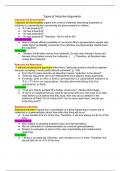
-
Unit 5 Types of Inductive Arguments
- Class notes • 2 pages • 2024
- Available in package deal
-
- $8.39
- + learn more
There are four types of inductive arguments: Induction by Enumeration, Reductio Ad Absurdum, Statistical Induction, and Higher-level Induction. Induction by Enumeration argues from specific instances to a generalization. Reductio Ad Absurdum argues against a position by showing it leads to absurd outcomes. Statistical Induction infers generalizations based on the probability of a thing happening. Higher-level Induction uses more general inferences to overrule lower-level ones. Examples are provi...
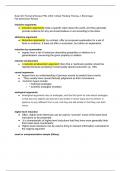
-
Exam #3: Format & Review PHIL 2303: Critical Thinking Thomas J. Brommage Fall 2023 Exam Review
- Class notes • 4 pages • 2024
- Available in package deal
-
- $7.99
- + learn more
The third exam for PHIL 2303: Critical Thinking, taught by Thomas J. Brommage, will cover various topics related to critical thinking. Inductive arguments are claims about the world that provide evidence for why we should believe or act according to the claim. On the other hand, abductive arguments offer proposed explanations for a set of facts or evidence. Induction by enumeration involves generalizing from a set of instances describing properties or relations. Reductio ad absurdum argues again...
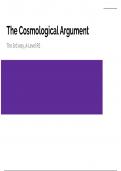
-
A-Level Religious Studies: The Cosmological Argument
- Summary • 12 pages • 2023
-
- $7.19
- + learn more
These study notes cover the Cosmological Argument as outlined in Thomas Aquinas' 3rd Way as per the AQA A-Level curriculum. With a breakdown of the context of Aquinas, the logic of his argument building and the strengths, weaknesses and critiques from Russel Hume and Mackie.
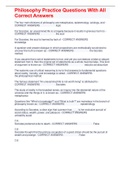
-
Philosophy Practice Questions With All Correct Answers
- Exam (elaborations) • 5 pages • 2023
- Available in package deal
-
- $11.99
- + learn more
Philosophy Practice Questions With All Correct Answers The four main divisions of philosophy are metaphysics, epistemology, axiology, and - CORRECT ANSWERS logic For Socrates, an unexamined life is a tragedy because it results in grievous harm to - CORRECT ANSWERS the soul For Socrates, the soul is harmed by lack of - CORRECT ANSWERS knowledge A question-and-answer dialogue in which propositions are methodically scru...
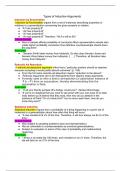
-
Unit 5 Types of Inductive Arguments
- Class notes • 2 pages • 2023
- Available in package deal
-
- $8.49
- + learn more
This documents has examples of induction arguments and the different types of inductive arguments. there are examples, critical factors and definitions of these different inductions.
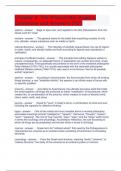
-
Chapter 2: The Presocratic Sophos Questions and Answers 2023
- Exam (elaborations) • 2 pages • 2023
- Available in package deal
-
- $9.99
- + learn more
Chapter 2: The Presocratic Sophos Questions and Answers 2023 sophos Sage or wise man; term applied to the first philosophers; from the Greek word for "wise" monism The general name for the belief that everything consists of only one, ultimate, unique substance such as matter or spirit. rational discourse The interplay of carefully argued ideas; the use of reason to order, clarify, and identify reality and truth according to agreed-upon standards of verification. princi...
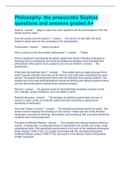
-
Philosophy- the presocratic Sophos questions and answers graded A+
- Exam (elaborations) • 4 pages • 2023
- Available in package deal
-
- $16.99
- + learn more
Philosophy- the presocratic Sophos questions and answers graded A+ Sophos Sage or wise man; term applied to the first philosophers; from the Greek word for "wise." How did society see the sophos ? As a bunch of odd balls, the early western culture was not very accepting of the philosophers, Presocratics before socratics Who is said to be the first western philosopher ? Thales Who is awarded for developing the greek culture from strictly following mythology to f...
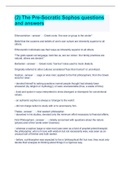
-
(2) The Pre-Socratic Sophos questions and answers
- Exam (elaborations) • 6 pages • 2023
- Available in package deal
-
- $17.99
- + learn more
(2) The Pre-Socratic Sophos questions and answers Ethnocentrism Greek roots: 'the race or group is the center" Belief that the customs and beliefs of one's own culture are inherently superior to all others. Ethnocentric individuals see their ways as inherently superior to all others. "The gods speak out language, look like us, are our colour. Our family practices are natural, others are deviant." Barbarian Greek roots: 'bar-bar' noise used to mock dialects. Originall...
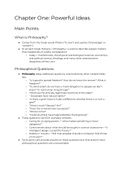
-
Your Introduction to Philosophy
- Class notes • 4 pages • 2023
-
- $10.47
- + learn more
This document discusses the bare minimum that the course will cover. It is great to look back to if you are at a dead end with the course. everything is explained within it from the different types of philosophy to what certain latin words mean in phrases that are commonly used within the course!
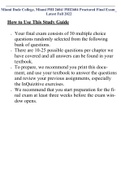
-
Miami Dade College, Miami PHI 2604/ PHI2604 Proctored Final Exam_ Latest Fall 2022
- Exam (elaborations) • 37 pages • 2021
-
- $21.49
- + learn more
Chapter 1 ETHICS AND THE EXAMINED LIFE MULTIPLE CHOICE 1. Not thinking too deeply or too systematically about ethical concerns a. isolates you from other people. c. ensures that no moral dilemmas arise. b. undermines your personal freedom. d. helps guide you to moral truth. 2. Which of the following is the overall point of the author’s discussion of “doing ethics”? a. Doing ethics is difficult, but not doing it is foolish. b. Doing ethics requires many years of careful study. c. Most peopl...



